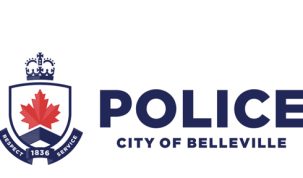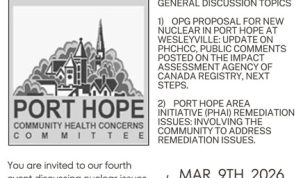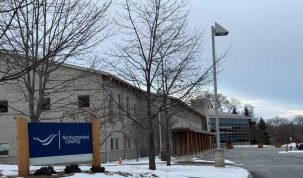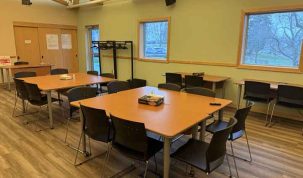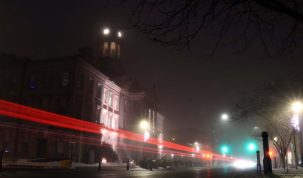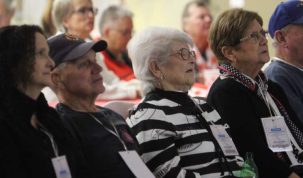
By Cecilia Nasmith/Today’s Northumberland
Transition House was a good neighbour for 17 years – but that relationship with the Chapel Street community where it is located changed when its core mission changed.
Representing the Good Neighbours Coalition Cobourg, Alyson King and Grace Lovekin appeared at Monday’s committee-of-the-whole council meeting to describe the result and appeal for help.
King said their group is an ad hoc committee of residents – and, because Chapel Street is so close to King Street, some downtown-business owners – who are concerned about locating an emergency shelter in a residential community.
Transition House was for many years a transitional housing program designed for relatively stable people having difficulty transitioning into more permanent housing situations. It closed for some months in 2018 and reopened as a low-barrier emergency shelter.
They understand the need, King said. The report they provided to council indicated that perhaps as many as 100 people in Northumberland County are homeless. Meanwhile, the 22 beds for adults at Transition House and the 17 to 22 beds for women and children at Cornerstone Family Violence Prevention Centre are continuously full.
This creates an overflow situation where homeless people have been known to congregate on the sheltered stairway at Trinity United Church, across the street from Transition House, making the situation more acute in that vicinity.
Since the reopening of Transition House in its new form, King said, the neighbourhood has experienced round-the-clock disruptions, verbal abuse and intimidate, even theft and break-ins.
In the first nine months of this year, she pointed out, emergency services have been called to Transition House almost 200 times – which amounts to almost-daily disruptions.
They have met with representatives from Transition House and Northumberland County but came away without any suggestions of what might be done to address the situation.
Meanwhile, Lovekin recounted some of the conditions the community’s residents (including children and vulnerable seniors) encountered over a recent 10-day period as factions from Trinity United Church and Transition House argued back and forth and even pursued some turf wars at the corner of Division and Chapel Streets.
People are finding terrible things on the front lawns where their children play, including feces, debris from shooting up illegal drugs, even (one one case) a gun and a knife.
Downtown, people have been running into businesses demanding to use the phone. Customers are asking to be escorted to their cars and employees are threatening to quit.
“Police are doing the best they can with the resources that they have, but we need more than simply just policing,” Lovekin stated.
“We are asking the town to focus on community safety and well-being to ensure the shelters serving high-needs clientele are appropriately located, away from families,” King added.
The low-barrier emergency shelter model has proven its value for the homeless in big cities, she said, “but introducing it into a small town changes the dynamic.”
They are not the experts, she allowed.
“All we can speak to is the impact on our neighbourhood and ask that Transition House be re-evaluaed with the broader impact on the community in mind.”
People in crisis situations do need shelter, King said, but long-time residents also need to be considered.
“We are frustrated. We are angry. We are depressed,” she said.
“We want to know what can be done right now to ensure everybody in the community feels safe,” she added, referring to the We Don’t Feel Safe buttons the group distributed among the gallery at the council meeting.
“I acknowledge and hear the emotion and frustration in your voice,” Councillor Nicole Beatty said.
“I also hear the compassion for the vulnerable and your concerns for community safety,”
Beatty urged the group to make a presentation for county council and the Cobourg Police Services Board.
“We are not asking that shelters be removed completely, but I think you need to take into consideration where they are located,” King said.
“I understand fully what that neighbourhood is going through – my dad lives in that neighbourhood,” Councillor Brian Darling said.
“He’s an 83-year-old man who lives close to what was just described as a drug house.
“But we have to go to the county. We can’t put these people out in the street again, because then it’s just going to get worse.”
Council passed a motion to draw the situation to the attention of key players and to dig deeper into the situation behind it. Actions include asking for information on crime and disruption in this area from the police, and on the change in Transition House from the county.
The county’s Affordable Housing Committee will also be asked for input and analysis on the recommendations put forth by the delegation.
Meanwhile, the coalition has set up a website at goodneighbourscoalition.org, which includes an on-line petition.
Delegation SCRIPT Monday, November 25, 2019 at 6:00 P.M., Council Chambers, Victoria Hall
ALYSON: Thank you for having us here today. We want to talk about 3 things: 1st, give you a brief introduction of who we are; 2nd, to give you an overview of what life has been like on Chapel St for the past few months; and 3rd, to ask for your support in ensuring community safety for all residents of Cobourg, both those who are unsheltered and those who have homes.
1. The Good Neighbours Coalition Cobourg (GNCC) was formed as an ad hoc committee of people living in the downtown neighbourhood. We are a diverse group of neighbours concerned about community safety and well-being. We are concerned about the direction the downtown area of the Town of Cobourg is heading as a result of Northumberland County’s decision to locate an emergency shelter serving high-needs people in Cobourg’s business, tourist, and downtown residential area. We worry about the people – those who are homeless, as well as those living, working and visiting in the surrounding neighbourhood. We are a group of people with a range of experiences and beliefs. Some of us are renters, while others own their homes. Some of us have lived in the area for over twenty years, others are newcomers. Some of us are business owners, others work in helping and caring jobs. Some of us are survivors of addiction and abuse, and some of us have experienced life in a shelter. We understand the issues and care about the people.
2. In spite of its name, Transition House (10 Chapel St., Cobourg) is currently operating as a very much needed low-barrier emergency shelter for all of Northumberland County. Transition House operated with few negative impacts on the surrounding neighbourhood for about 17 years until adopting a new low-barrier, Housing First model at the time it reopened in October 2018.
Since it has reopened, the neighbourhood has experienced increased and recurring problems with public drug use, people sleeping outdoors, verbal abuse and intimidation, disruptions day and night including physical altercations, theft, and break-ins. While Transition House may not be the “cause” of these problems, it is clearly associated with them as the problems did not occur at this level until it reopened under the new model. Between January and September 2019, one newspaper reported that emergency services were called to Transition House over 200 times: over 83 times to the Northumberland County Paramedics; over 100 times to the Cobourg Police; over 23 times to the Cobourg Fire Department.
This amounts to almost daily disruptions simply due to EMS calls. Add in the non-reported disruptions and it is clear why those living near Transition House are feeling overwhelmed. Over the past few months, we have met with various representatives of Transition House and Northumberland County, among others, to explain our concerns, but our concerns are regularly dismissed as being a larger community problem and not the responsibility of those running and funding Transition House as an long-term, low-barrier, crisis-oriented emergency shelter. To be clear, the community’s fear comes from the presence of drugs and discarded needles, uncertainty about whether or not people acting erratically are on a “bad trip” and the resulting potential for danger, and having increased levels of break-ins and trespassing on personal property near children and other vulnerable residents. It is not the fact of an individual being homeless that causes concern; rather, it is the aggressive behaviours and public use of illegal drugs. We are not reacting to the stigma of homelessness or to a new facility; rather, we are reacting to actual incidents and behaviours witnessed and dealt with over the last year.
GRACE Both A. and J. have lived in their homes for over a decade. In the past year, they have experienced interruptions almost daily. Over a 10-day period, this is what A.’s experience was like: Oct 4th – throughout the day, people living on the steps of Trinity United Church and residents of Transition House were arguing, swearing and cursing back and forth. After the second disruption, she called the police. Later that same day, her neighbour had to walk downtown using a walker.
As she approached the church, she felt nervous and intimidated because the sidewalk was blocked by people at the bottom of the alcove steps and nobody moved until the very last moment. Oct 10th – there was a fight over “Turf” on the corner of Chapel and Division. This incident was video-recorded by another neighbour and went viral on Facebook. Oct 19th – Early in the morning, she was woken up by screaming and swearing. When she called the police, they were already on their way and a resident of Transition House was removed by police. Oct 24th – At about 9 pm, A. was outside with her dog talking with her neighbour. They noticed a car with someone in it parked in front of a neighbour’s empty house. There had been an attempted break-in the night before. Because the car was there for about 30 minutes, they approached the person to see who it was and what they were doing. When asked what she was doing and if she was ok, the person refused to respond.
They told her that the police would be called to check things out (which is what the police have told us to do if we see anything concerning). While Angela was on the phone with the police, the person began screaming that she was a “fucking racist bitch.”
These examples are just a few of what A. has experienced.
In addition, she regularly has people running through her backyard and jumping the fence to outrun the police. Her daughter and her friends have been accosted by residents of TH. Until this past year, she had never had a problem with Transition House, but as a single mom with a 16 yr old daughter, A. no longer feels safe. J. – also has a 16-year old daughter.
She lives two doors away from A. and experiences similar disruptions. In addition, she has found a gun and a knife on her front lawn, as well as debris from people shooting up in public spaces.
P. – has lived immediately beside Trinity United Church for over 30 years and has had a good relationship with Transition House since it first opened 17 years ago. However, since it re-opened, she became afraid to go for her early morning walks – something she has been doing daily for decades. P. uses a walker and has felt intimidated by the people hanging out and sleeping on the Church steps when walking the two blocks to downtown.
K. – is a small-business owner, as well as a resident of the neighbourhood for almost 30 years. Her clients have arrived in the mornings to the sight of people sleeping around the parking area and by the side of the creek and fearing that they are either dead or injured. They have had random people run into their shop to demand the use of their phone and other things. They now walk clients back to their cars and plan schedules so that no one is working alone in the evenings.
Another small business has had a serious increase in thefts, as well as $7000 in vandalism and significant intimidation of employees. They are considering hiring a security guard because their employees are thinking about quitting. Other small businesses have had their mail stolen and people have attempted to cash their cheques.
R. – is also a business owner and long-time resident. He has invested much time and money into improving properties in the downtown area of Cobourg. He is concerned about the impact of the increase in crime and public drug use on property values. In addition, as a grandparent of children in the neighbourhood, he worries about their safety.
I am the mother of those grandchildren. We have found discarded needles on our front lawn. Between my family and the two others next door, there are 9 kids under the age of 10 who run and play on the lawns. On Oct. 23, S. and her family – were woken up in the middle of the night by her dogs barking to find a woman who was stoned or drunk attempting to break in through her front door. While she was checking the doors, her young daughter called 9-1-1.
The person was already known to police and no arrest was made. Several other neighbours also have had break-ins and attempted break-ins of their homes, rental units, and cars. The police are doing the best they can with the resources they have. They have been proactive in creating new programs to help with prevention and arresting drug dealers. But we need more than simply policing.
ALYSON 3. We are asking the Town of Cobourg to focus on Community safety and wellbeing by ensuring emergency shelters serving high needs clientele are properly located away from vulnerable community members because research demonstrates that “People who inject drugs and lack stable housing are more likely than others to report using drugs in public and/or unhygienic locations (e.g., alleys, stairwells) and to rush their injecting to avoid being caught by police or victimized by others.”
3 The low-barrier, Housing First model is the current best practice for addressing homelessness. However, it has only been studied and tested in cities. We believe that solutions used in large urban centres cannot simply be transplanted to small rural towns without due consideration for the nature of small communities. We beg you to consider the broad impact of this increase in the number of unsheltered people with addictions not only on the surrounding neighbours, but also on local businesses and tourism.
In the 2018 Housing & Homelessness Annual Report, the County states an intention to align “homelessness services and activity with other county-wide strategic initiatives including Community Safety and Well-being ….” This has not been done. The Town of Cobourg and the County have allowed these problems to be introduced into the downtown area without due consideration for their broad impact on community members. Every time we meet with any representatives about these issues, we have been asked what our solution would be, because it is, after all, a community problem.
We are not experts in these concerns. All we can speak to is the impact the status quo is having on our neighbourhood. Just as the Cobourg Police Services were forced to re-evaluate how their warming centre was operating, we ask that Transition House be re-evaluated with its broader community impact in mind. In that regard, our first solution is to beg the Town to insist that the County reestablish Transition House to serve as a real Transition House for those who are fairly stable and who are transitioning from being unsheltered. We are mindful that doing so would leave some folks without access to a shelter.
Therefore, we suggest that you continue to work with the County and other levels of government, charitable organizations, and health units to come up with creative action suitable for a small town. It is important that whatever actions are initiated be ones that focus on the intersections between addictions, mental health, dual diagnoses, and homelessness within a small town context. What works in large cities will not work in small towns without creative rethinking. One possibility that we have suggested is to create a specialized Shelter located near the hospital, mental health services, and addiction supports.
This is simply one suggestion because the status quo is not working. Some of us recently watched the film Us&Them. I’ve also read Jesse Thistle’s memoir of being homeless. Even though there are inspiring moments in those stories, I personally found these stories discouraging in thinking about feasible ideas. In Jesse’s story, he got clean and off the streets through a residential rehab program. In the film, the story centred (in part) around access to a supported housing facility for those who were chronically unsheltered with space for support services and so on. We are told that low-income or affordable housing is coming, but if these are new builds, they are not going to come very quickly.
We agree that these big projects are essential for long-term sustainability. Similarly, addiction prevention and poverty reduction programs are even more important if we want to break the cycle of trauma, poverty, addiction and homelessness. But something needs to be done immediately to help people get off the streets and to ensure broader community safety. When we have made suggestions to those with the power to make change, we are told there is no money.
This seems to say that we must simply put up with the status quo. But the status quo is not working. What are some suggestions? In our petition, we suggested a specialized emergency shelter that can help individuals to access rehab and harm reduction programs and mental health supports. But, we are told this is just warehousing people and that it is not good enough.
So, people will keep sleeping on the streets. We could suggest a larger-scale hub-style solution, that includes residential rehab, supported housing, additional emergency shelter beds, mental health services, access to medical personnel, rehab programs, methadone and safe injection spaces. But, we are told we don’t have the money for this. So, people will keep sleeping on the streets.
If we know from the Us&Them film and other research that the path to homelessness and addiction frequently starts at birth when parents are unable to provide the love and care for them due to poverty or generational trauma, what could we do? What about ensuring that people have access to shelter, food, and medicines through a Basic Annual Income, but that program was cancelled in the middle of testing. Housing is a basic human right, but without change, people will keep sleeping on the streets. We are frustrated and angry and depressed. What can be done right now to get people off the streets and into support programs? What can be done right now to ensure everyone in the community feels safe?





